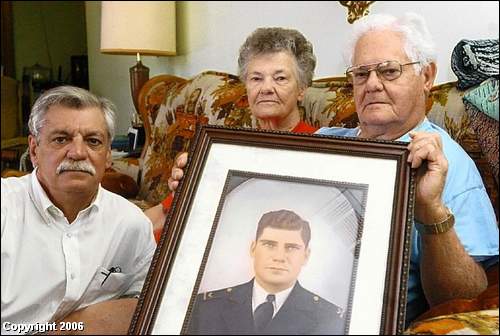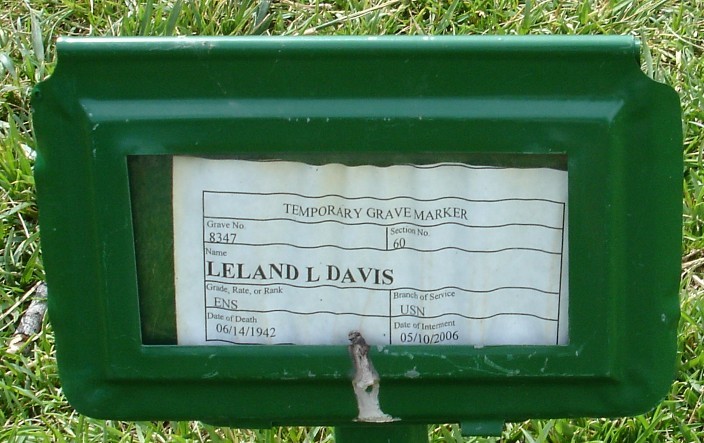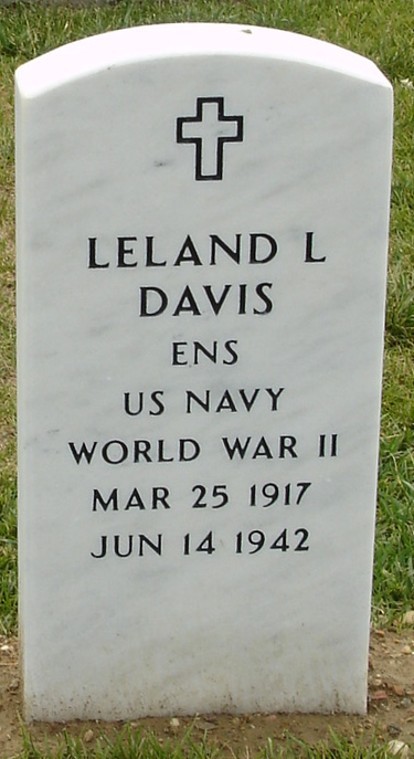Leland L. Davis
- Ensign, U.S. Navy
- Service # 0-146517
- United States Navy
- Entered the Service from: Mississippi
- Died: 15 June 1943
- Missing in Action or Buried at Sea
- Tablets of the Missing at Honolulu Memorial
- Honolulu, Hawaii
- Awards: Navy Cross, Purple Heart
Nephew Mike Davis, (from left) sister Pattie Pavlenko and brother Charles Davis recently attended
the funeral of Navy Ensign Leland L. Davis, who was killed in the Aleutian Islands off Alaska in 1942 and recently
was buried in Arlington National Cemetery near Washington.
Pattie Pavlenko thought the call was bogus. She questioned the voice on the other end in a hostile tone, wanting to know how the woman had gotten her number.
The memory of her brother – a hazel-eyed, athletic naval officer who loved baseball – already had been laid to rest. His plane going down at sea during a takeover of a Japanese-held Alaskan island and his body forever obscured by elements had been the long-held images of his demise.
But the woman on the other end of the line, a genealogist, was trying to tell Pavlenko something different, that her brother’s remains and grave site had been discovered – six decades after his death.
Ensign Leland Davis was buried at Arlington National Cemetery.
“I was in a state of shock. I had to write her a letter of apology because, when I first started talking to her, I thought we were being scammed,” said Pavlenko, now 79, and a resident of Columbus.
Ensign Leland “LaFroy” Davis, who died at age 25, was buried last week at Arlington National Cemetery with full military honors. He had been among about 78,000 World War II service members unaccounted for.
Davis piloted a seaplane, a Navy PBY-5 Catalina, that took off from Kodiak Island, Alaska, with its seven-member crew on June 14, 1942, to attack Japanese targets in Kiska Harbor. It was part of the only military campaign fought on North American soil during the war.
After running into bad weather and heavy Japanese anti-aircraft fire, they crashed on the island of Kiska, held by the Japanese.
A telegram to his mother at the time read, “The Navy Department deeply regrets to inform you that your son, Machinist Leland LaFroy Davis, United States Navy, is missing.
“The department appreciates your great anxiety … To prevent possible aid to our enemies, please do not divulge the name of his ship or the station.”
The United States retook the island from the Japanese in August 1943.
A grave marked “Seven U.S.N. Airmen” was all that remained of the crew, and ensuing attempts to locate the site were not successful – until a Canadian wildlife biologist researching Norway rats ventured to the islands in 2002.
He found an inflatable life vest, a parachute, two parachute packs, leather boots, a sweater and fragments of footwear.
The plane’s wreckage was found on the side of Kiska Volcano and not in the water as the family had believed for so long.
In 2003, the Joint POW/MIA Accounting Command excavated the crash site. Debris and the remains of the servicemen were found.
Pavlenko, who was still a child when her brother joined the Navy at age 18, has struggled over the years to hold on to his image.
“My youngest sister, who is two and a half years younger than me, remembers him vividly. I do not. I have laid in bed at night. I’ve tried to see him. I can’t,” she said.
“I have just imagined what happened to him and how it happened and wondered if they died instantly or if they laid there or what. But it’s just wonderful that now we can have some closure in our family. We never did.”
Davis, who was raised in Hinds County, loved baseball. He loved to light firecrackers, swim and steal watermelons.
“He made the Navy his career,” said his brother, Charles Davis, an 82-year old Jackson resident and a World War II veteran himself. “He was a happy-go-lucky fella.”
His brother was promoted posthumously to ensign.
The ceremony was beautiful and sad, family members said. Taps and the salute of 21 gunshots tore them up inside.
“We hadn’t really seen our brother,” Charles Davis said. “We didn’t really know him for the last 60 years, and we all decided that with his exploits and his medals, he should be buried in Arlington.”
The family wants people to know the sibling they never got a chance to know was a hero. And Pavlenko wants to sleep better at night.
“I hope I am at peace now,” she said.
Michael Robert Patterson was born in Arlington and is the son of a former officer of the US Army. So it was no wonder that sooner or later his interests drew him to American history and especially to American military history. Many of his articles can be found on renowned portals like the New York Times, Washingtonpost or Wikipedia.
Reviewed by: Michael Howard



